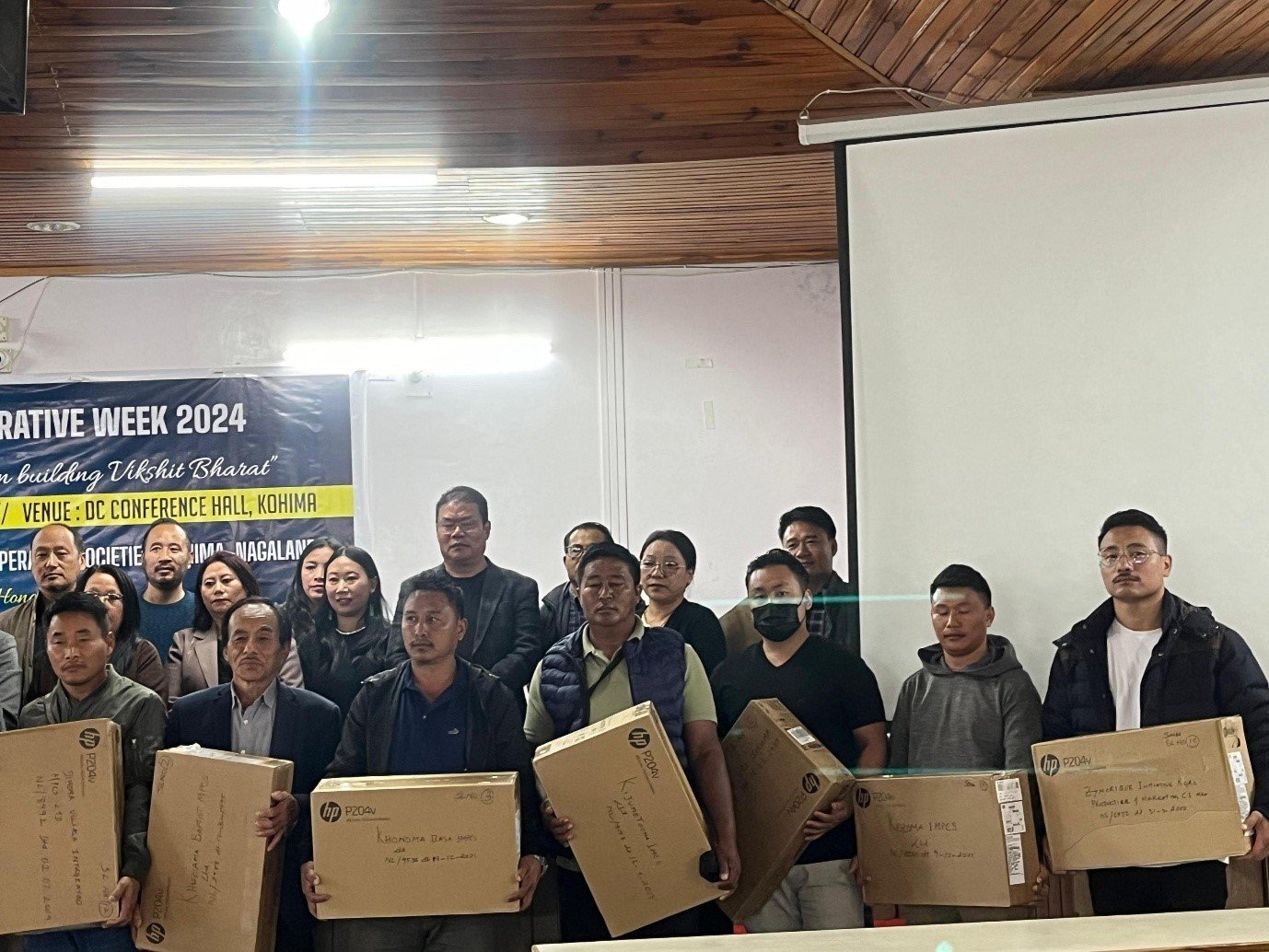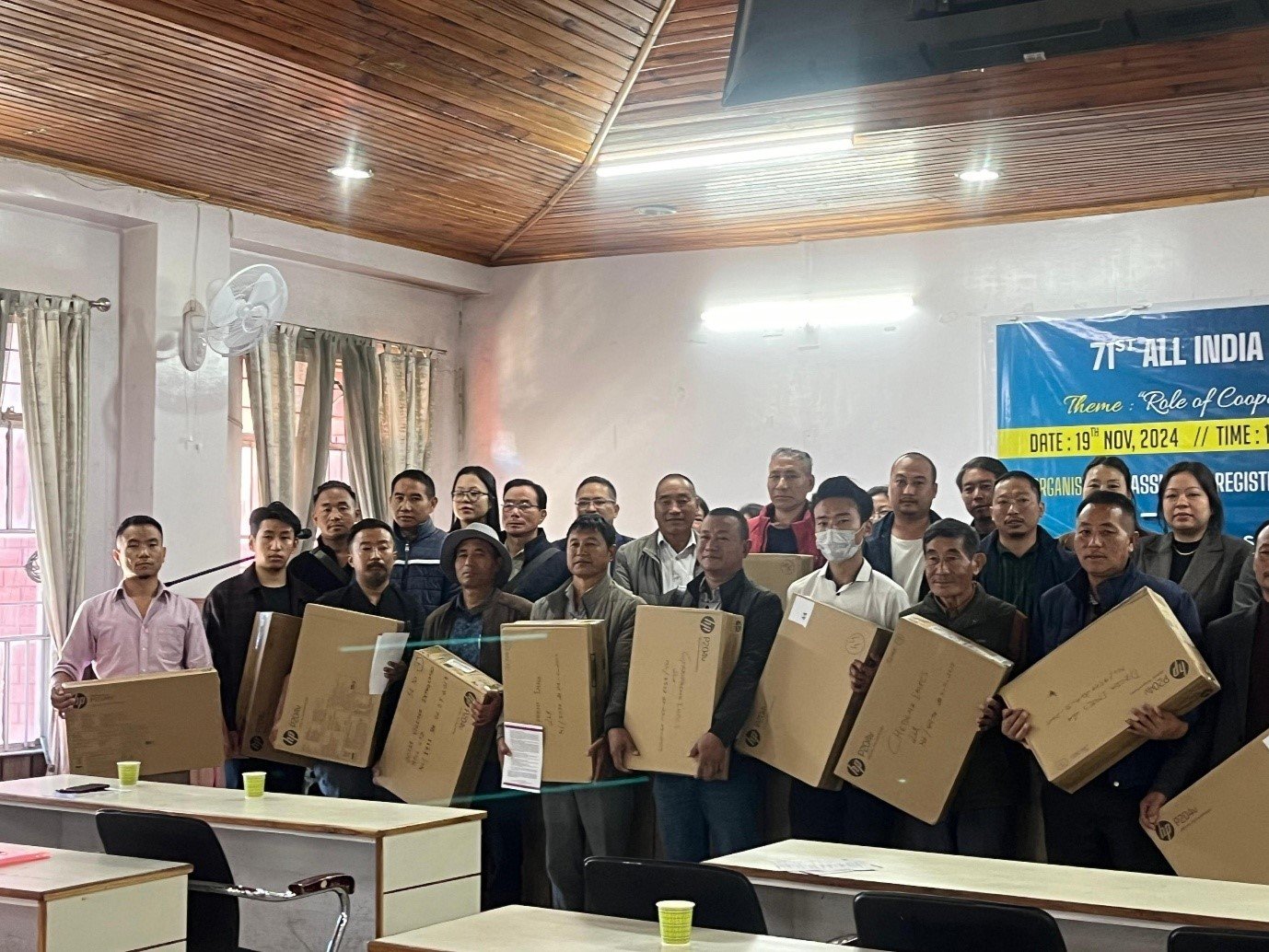On November 19, a distribution of computer hardware to beneficiary societies took place, marking the 71st All India Cooperative Week 2024, celebrated from November 14-20 under the theme “Role of Cooperatives in Building Viksit Bharat.”
Held at the DC conference hall, Kohima, 23 full computer set was distributed at the program including VPN, Printer and censor. This was organised by the office of assistant registrar of cooperative societies Kohima.
This initiative aims to enhance the efficiency of Primary Agricultural Credit Cooperatives (PACS) by beginning their computerization. Currently, 33 functional PACS are being connected to NABARD through a unified National Software Network in the first phase, while 198 additional PACS are set to join in the second phase. The Central government has proposed a budget of Rs 709.17 lakh for the State of Nagaland to support hardware purchases, digitization efforts, and the establishment of necessary support systems. The project’s objectives include implementing a Common Accounting System (CAS) and a Management Information System (MIS) that enable PACS to perform their operations online and access refinance or loans for various activities from NABARD through StCBs. Additionally, the project aims to enhance the efficiency of PACS operations.
Guest of Honour, Rhosietho Ngouri, NCS Additional Deputy Commissioner of Kohima, highlighted the Viksit Bharat initiative launched by Prime Minister Narendra Modi, which envisions a developed India by 2047. He remarked that everyone is actively contributing to this vision.
He pointed out that success stories often begin with small steps, encouraging everyone to start their journey from somewhere. He asked those present about their contributions to transforming India into a developed nation, emphasizing that all land in Dimapur is fertile and presents many opportunities, particularly in Kohima and Dimapur, where everyone can contribute in small ways.

Ngouri observed that very few Nagas are producers, with most being consumers, stressing the importance of exploring production opportunities, adding that these societies are established to create job opportunities and promote self-sufficiency.
Download Nagaland Tribune app on Google Play

In his keynote address, Deputy Registrar of Cooperative Societies, Rokovisa Chase, noted that the All India Cooperative Meet aims to share success stories, visions, and challenges faced by cooperative societies, followed by discussions that lead to policy formation. He highlighted that the event takes place at national, state, and district levels. Chase remarked that Nagaland has its own cooperative society act and highlighted that India is currently the most populous nation in the world, experiencing swift economic growth.
He emphasized that 1% of the population controls 40% of the resources, underlining the economic disparity in the country and the vital role of contributions from citizens towards national development. Chase noted that approximately 74 schemes are part of the cooperative framework.
Furthermore, he brought attention to the fact that over 70% of registered unemployed individuals in Nagaland are educated, with 50% of educated youth currently jobless. Among them, 47% hold postgraduate degrees and 45% are graduates, leading to significant social challenges.

Additionally, he pointed out that there are only about a thousand government jobs available each year in Nagaland, which is minimal compared to the state’s unemployment rate. “The situation is such that even MTech graduates and specialized students are applying for fourth-grade government positions.
This is where cooperative societies can play a crucial role,” said Chase.
Sazolie Angami, Secretary of Chedema Village Integrated MPCS Ltd., Kohima, and Khwebinlo Seb of Sha Agri and Allied CS Ltd., Tseminyu, shared their experiences on behalf of their societies. They discussed their activities, vision, struggles, challenges, and future plans.

